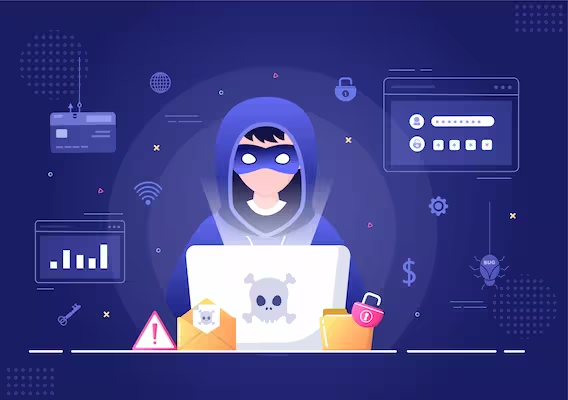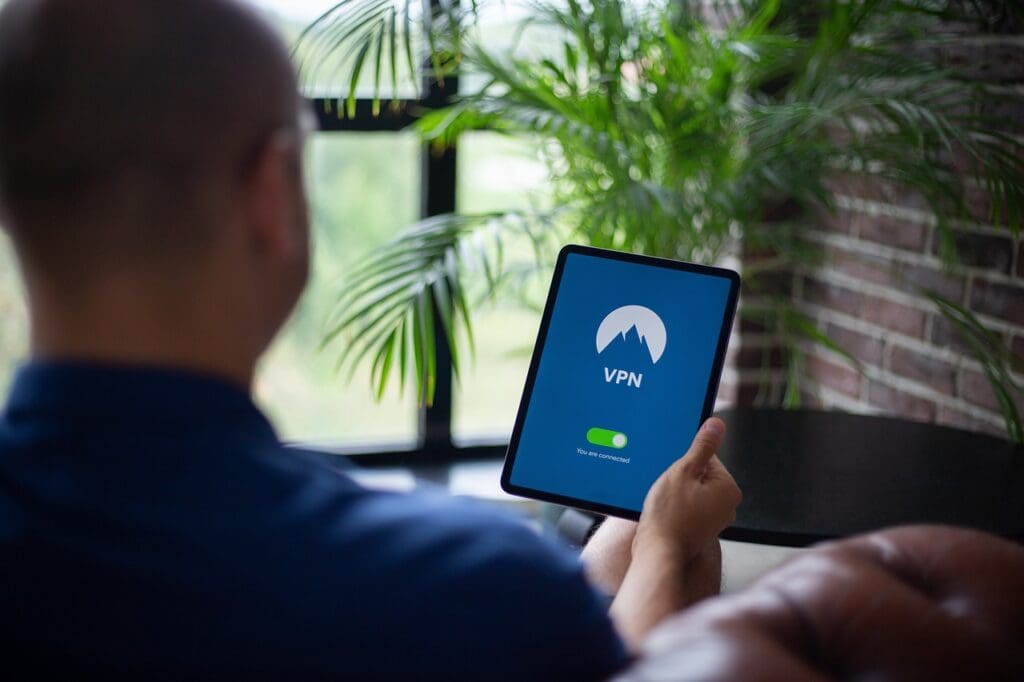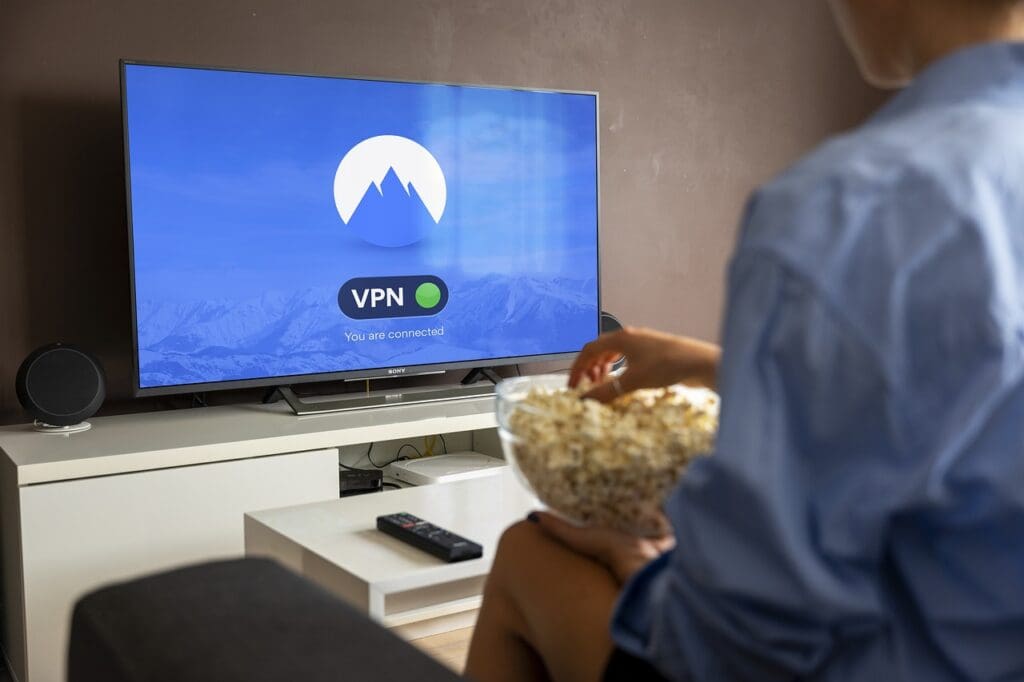Discover our selection of VPN software, designed to guarantee your online privacy and security. Whether you want to protect your personal data, access geo-restricted content or browse anonymously, these powerful tools offer advanced features for optimum protection. Enjoy a secure connection, high browsing speeds and a user-friendly interface. Ensure digital peace of mind and online freedom
Cyber Ghost VPN is a comprehensive virtual private network service offering advanced security, maximum confidentiality and unlimited access to geo-restricted content. With its advanced features, user-friendly interface and commitment to user data protection
Express VPN is a virtual private network (VPN) service renowned for its speed, security and reliability. ExpressVPN offers a complete solution for protecting your online privacy, securing your data
NordLayer represents a complete solution for securing professional networks, offering a robust and flexible infrastructure tailored to today’s business needs.
NordVPN is a virtual private network service provided by Nord Security. It gives access to more than 5,500 servers in 59 countries and allows simultaneous use on six different devices.
OpenVPN is a robust, flexible VPN solution for both private and corporate users, offering a high level of security and freedom of configuration.
Private Internet Access (PIA) is a VPN service provider with a long-standing market presence and features focused on protecting online privacy.
PureVPN is a comprehensive and reliable VPN service, offering an excellent balance between security, privacy and performance. It is ideal for both private users looking to secure their browsing and businesses looking to protect their communications.
Sucuri Builds the most effective and affordable cloud-based services for website security and performance, while producing the most concise educational resources on website security.
Surf Shark is a comprehensive virtual private network (VPN) service that combines advanced security, maximum privacy and unlimited access to geo-restricted content. Thanks to its innovative features, user-friendly interface and commitment to user protection
In our day-to-day lives, where surfing the web is a must, protecting your online privacy is essential in the face of malicious software and the risks of hacking and surveillance. A VPN (Virtual Private Network) is essential for securing your online data. This cybersecurity service encrypts your data using VPN software and hides your IP address by activating camouflage mode for safe, anonymous browsing. It is particularly vital on public Wi-Fi networks, protecting against data theft and enabling access to geo-restricted content without compromising your digital identity.
This guide explains how a VPN works, how to choose the right one for optimum protection of your online privacy, focusing on the key features of VPN software and the mistakes to avoid.

A VPN, or Virtual Private Network, plays an essential role in enhancing your online experience thanks to several key features.
Above all, it protects the confidentiality of your personal data by encrypting it. This protection is essential, especially on public Wi-Fi networks, where the risks of hacking and data theft are heightened.
A VPN ensures your anonymity by masking your IP address, preventing websites and ISPs from tracking your online activities or determining your location.
It also enhances secure connectivity through the use of advanced encryption protocols, such as IPSec, protecting your data from unauthorized access and attack. This feature is particularly valuable for businesses requiring secure remote access to their professional networks. Nordlayer is a platform specifically designed to provide security and ease of access administration in a business environment.
VPN offersaccess to geo-restricted content by modifying your IP address, enabling you to bypass regional blockades to access streaming services, websites and content inaccessible from your region.
There are several essential stages in the operation of a VPN.
When connecting to a VPN, your device establishes a link with a remote VPN server, creating a secure data tunnel. In this tunnel, your data is encrypted before being sent, guaranteeing its protection.
The main steps include :
This process, though complex, takes place discreetly in the background, enabling secure, anonymous browsing free of any geographical restrictions.

When choosing a VPN, security and confidentiality are absolutely essential.
Make sure your VPN uses robust security protocols such as AES, Openvpn or WireGuard to ensure that your personal data remains protected against any intrusion attempt.
Another important aspect is the no-logs policy. Opt for a VPN that pledges not to retain its users’ activity logs, which means that no information about your online activities will be stored. This transparency on the no-logging policy is vital to maintaining your total confidentiality.
Additional features such as the kill switch, which automatically cuts your Internet connection if the VPN disconnects, are highly beneficial for your data security.
Browsing speed is an important criterion, especially if you use your VPN for activities that require high bandwidth, such as streaming or online gaming.
Speed can be influenced by a number of factors, including encryption quality, distance from the VPN server, server load and the security protocol used.
Choose a VPN that has invested in a robust infrastructure and maintains high connection speeds, even with encryption enabled. Independent tests, such as those carried out by AV-TEST, can help you identify the fastest VPNs on the market.
The VPN’s compatibility with your devices and operating systems is also essential. Make sure the VPN is compatible with your devices, whether Windows, macOS, Linux, Android or iOS. Extensive compatibility will enable you to protect all your devices connected to the Internet.
Check whether the VPN offers applications and extensions for the main web browsers, which will make it easier to use and configure the service.
The number and distribution of servers are important factors in VPN performance and flexibility. A large number of servers in different countries means you can choose the server closest to your location, which improves connection speed.
A wide distribution of servers helps you bypass geographical restrictions and access geo-restricted content.
Even if the number of servers is not the only determining factor, having servers in many countries guarantees better coverage and more stable performance.
VPN password management is essential to protect your privacy. It’s advisable to choose a VPN that adopts a strict no-data-retention policy, ensuring that your password management and no record of your online activities will be retained.
This policy must be transparent and, ideally, confirmed by independent audits. The presence of our head office in a country that rigorously respects data protection offers an additional guarantee of confidentiality.
Ease of use and quality customer support are essential for a satisfying user experience. Choose a VPN with intuitive applications and user interfaces, simplifying configuration and day-to-day use. Responsive customer support, available 24/7, is essential for dealing effectively with any technical problems or questions.
Consult user reviews and ratings can give you a reliable idea of the quality of customer support offered by the VPN provider.

Encryption protocols are an essential pillar of VPN security. A quality VPN must employ robust encryption protocols to safeguard your data from interception and malicious attack. Among the most widely used protocols are AES (Advanced Encryption Standard), OpenVPN and WireGuard.
These protocols provide a high level of security, with OpenVPN and WireGuard particularly renowned for their reliability and flexibility. Their use guarantees the encryption of your data, making itindecipherable for any unauthorized party, even in the event of interception.
Kill Switch is an advanced security feature that blocks your device’s Internet access if your VPN connection is suddenly interrupted. Internet access is automatically restored once the VPN connection is secure again.
This preventive measure protects your personal data and IP address from accidental exposure. It is essential for preserving the security and confidentiality of your online data.
There are two Kill Switch variants: one protects only certain applications, the other secures the entire system.
Split tunneling is a feature that allows you to divide your Internet traffic between the VPN connection and the traditional Internet connection. This means that some applications or types of traffic can be routed via the VPN, while others use the direct Internet connection. This option is advantageous for improving speed and performance, particularly when certain applications do not require VPN encryption or protection.
With split tunneling, you have the freedom to choose which applications need to run over the VPN and which can operate without, optimizing your bandwidth management and minimizing the risk of slowdowns.
Double VPN or Multi-Hop introduces an extra level of security and confidentiality to your connection. Instead of passing through a single VPN server, your traffic is successively redirected through two or more VPN servers. Each server applies a new layer of encryption and modifies your IP address, making your traffic virtually undetectable.
This technique, also known as VPN server cascading or chaining, enhances protection against complex attacks and traffic analysis, makes it easier to bypass geographic restrictions and improves your online anonymity.

Opting for a free VPN may seem attractive at first glance, but this option often has more disadvantages than advantages. Free VPNs carry serious risks for your security and privacy.
To generate revenue, these services may sell your personal data to third parties, anonymously, to improve their product, jeopardizing your privacy.
What’s more, you could experience reduced performance, with bandwidth limits and slower browsing speeds, not to mention targeted and intrusive advertising based on your personal data.
The security offered by these free VPNs is also questionable, increasing the risk of IP address leaks and privacy breaches.
Ultimately, despite the appeal of a no-cost service, the dangers associated with free VPNs clearly outweigh the expected benefits.
It’s essential to read the privacy policy and terms of use carefully before choosing a VPN. These documents reveal how your data is processed, what is recorded and how it is used. A reputable VPN should guarantee a no-data-retention policy, ensuring that no record of your online activities will be kept.
Also consider whether the provider directly manages its servers, which can improve the security and confidentiality of your information. The laws of the country where the servers are located may affect the protection of your personal data.
Confirm that the provider treats all users fairly, without unjustified connection restrictions, regardless of the devices, protocols or applications used.
Testing a VPN before committing to a subscription is important to ensure that it meets your expectations. Take advantage of the free trial periods or money-back guarantees offered by many providers to evaluate the quality of the service without financial risk. These periods are an opportunity toappreciate the speed, connection stability and features on offer.
Make sure the VPN is compatible with your devices and operating systems, and that the applications are easy to use.
The quality of customer support is another point to check, as responsive assistance can be decisive in the event of a technical problem.
Check that the VPN does not excessively hinder your Internet connection speed, and that it is free from data leaks or other security vulnerabilities.

Evaluating a VPN requires careful attention to several key performance criteria to ensure it meets your expectations.
Connection speed is one of the most critical elements. To measure this effectively, tools such as Speedtest can be used to check download, upload and latency (or ping) speeds. It’s advisable to run these tests on different servers and at different times to get a complete picture of performance.
Equally important is the stability of the connection. Make sure your VPN connection is reliable over time, and doesn’t disconnect frequently.
Jitter and packet loss should also be assessed, as they directly influence the quality of your connection, especially for activities requiring real-time responsiveness such as gaming or videoconferencing.
Analysis of file transfer times and network throughput reveals the VPN’s ability to handle large volumes of data.
These analyses are essential to determine whether the VPN meets your specific needs, whether for streaming, downloading large files or simply day-to-day browsing.
Protection against cyber-attacks is a fundamental pillar in the evaluation of a VPN. Leak tests are essential to ensure that your data is well protected. These include IP, DNS, WebRTC and IPv6 checks , and can uncover any exposure of your IP address, DNS queries or WebRTC information despite the use of a VPN.
A DNS leak test determines whether your DNS queries pass through the VPN provider’s servers or through external servers, which could reveal your online activities.
A WebRTC leak test checks whether your browser is disclosing your IP address via the WebRTC protocol.
An IPv6 leak test ensures that your IPv6 address remains secure when using an IPv4-only VPN.
These tests are essential to protect your privacy and security online.
Theeffectiveness of customer support is often underestimated, but remains a decisive criterion when choosing a VPN. A responsive and available customer support team can help you considerably in the event of technical problems or questions.
It’s important to check that the provider offers 24/7 support, via live chat, email or telephone. You should also assess the quality of the resources provided, such as configuration guides, FAQs and discussion forums. Well-structured documentation and rapid responses are the hallmarks of quality customer service.
Consultation of user reviews can also give you an insight into the general satisfaction of customers with the support offered by the VPN provider.
Choosing the right VPN is essential for protecting your privacy on the Internet, guaranteeing your security and enabling you to overcome geographical restrictions.
It’s important to understand how VPNs work, and to take into account security, performance and compatibility criteria, while avoiding the pitfalls of free offers and unclear privacy policies.
It’s advisable to test the VPN on several aspects, including speed, security, and customer service efficiency. Choose a VPN that offers advanced encryption protocols, such as Nordvpn which is known for its double encryption with Double VPN mode, a vast selection of servers, and adheres to a strict no data retention policy.
Don’t wait any longer to invest in a quality VPN, such as Purevpnwhich offers a rich user experience with features such as split-tunneling and a wide choice of servers, ensuring a secure, anonymous and unrestricted browsing experience. Your online privacy depends on it.
Installing a VPN on your phone offers several key advantages. It secures the Internet connection by encrypting data, protecting sensitive information from hackers and ISPs. For those concerned about malware and site attacks, integrating a dedicated firewall like Sucuri can be added to the VPN for enhanced security.
A VPN also enables you to bypass geographical restrictions, accessing content such as Netflix programs or streaming services restricted to certain regions. What’s more, it ensures secure, anonymous browsing on public Wi-Fi networks, such as Private internet Access, which advocates a strict policy of not keeping activity logs, and can even improve internet connection quality and speed.
Some VPNs offer free options, but with restrictions.
ExpressVPN, despite being a premium service, sometimes offers free trials or limited offers to allow users to test their advanced services.
Surfshark periodically offers free trials or refunds in the form of a money-back guarantee.
This allows users to try out services securely before making a financial commitment.
To activate a VPN for free, follow these steps:
For added simplicity, solutions like Utunnel VPN offer easy configuration for individual users or small businesses looking to set up their own VPN network with little technical effort.